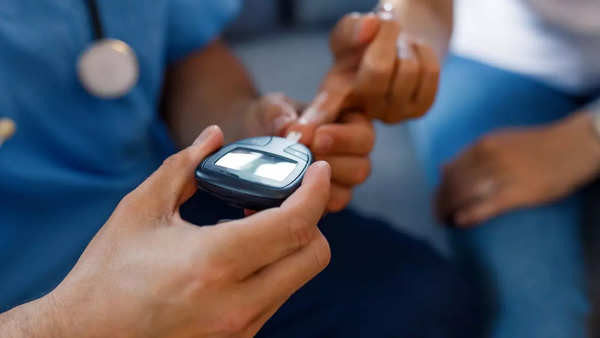When you wake up in the morning, movement might not be the first thing on your mind. However, starting your day with a brisk walk can offer your body a number of health benefits. If you have
diabetes
, it is highly recommended that you go for morning walks regularly to keep your sugar levels in check. By regulating the insulin and Glucagon levels in the body, the benefits of morning walks can be highly effective for your body. Walking allows the muscles to use more glucose in the body and helps burn extra body fat, and body mass index (BMI) is also improved. A 30-minute
morning walk
helps maintain reasonable blood sugar level control and insulin management in type 2 diabetes.
Brisk walking helps cut risk of diabetes
According to a study published in British Journal of Sports Medicine, a faster pace of walking is linked to a lower risk of developing diabetes. In the study, it was found that instead of casual walking at the speed of less than 2 mph, walking 2 mph to 3 mph or brisk walking reduced 15% of diabetes risk. Going faster than 4mph was linked to a 39% lower diabetes risk.
Impact of post-meal walking
Walking for even two minutes after your meals are enough to aid digestion and balance your blood sugar spikes. According to a study published in journal Springer Nature, a 2-minute walk after a meal can help stabbilise blood sugar levels. The study also suggested that the best time to walk is within 60 to 90 minutes after eating, a window where blood sugar are usually at peak.
Researchers said even just a few minutes of light-intensity slow walking was enough to create a noteworthy drop in blood sugar levels for study participants.
Walking, the easiest way to manage blood sugar
Let’s swallow the bitter pill. The news that you have been diagnosed with diabetes, itself ain’t a piece of cherry news at all. If anything, being diagnosed with diabetes (or any other difficult and chronic disease) tends to drain the patients from the very initial stage. However, doctors and caregivers try their best so that the patients do not their morale to fight the disease. Because, though there is no cure for diabetes, but it can be managed and reversed in many cases even. With a regime of a clean and healthy diet, proper exercise, and keeping a check on blood sugar, one can easily manage diabetes and still live a perfectly normal and regular life.
Amongst many other avenues to manage diabetes, signing up for regular morning walks is one of the healthiest and best options. A morning walk can help you burn up to 300 calories by using up stored fats and sugars. It reduces your craving for sweets and helps moderate blood sugar levels, which reduces the risk of Type 2 Diabetes.
Morning walk and its other benefits
While many people go for a morning walk on an empty stomach, in case of people with diabetes, doing so may cause your blood sugar to drop very quickly.
Apart from helping with diabetes, morning walk has an array of benefits, such as:
Improved mood and energy: Walking in the fresh air can reduce stress and anxiety, and improve your mood and self-esteem. Studies show that adults who walked for 20 minutes outdoors experienced more vitality and energy than those who walked for 20 minutes indoors. For best results, try walking for 20 to 30 minutes at least 5 days a week.
Weight management: Walking in the morning may help you meet your weight loss goals. Walking at a moderate pace for 30 minutes can burn up to 150 calories. Combined with a healthy diet and strength training, you may find you lose weight.
Reduced risk of disease: Walking can reduce your risk of heart disease, stroke, high blood pressure, and cancer. Walking for 30 minutes per day can reduce your risk for heart disease by 19 percent.
Improved bone and muscle strength, balance and posture: Walking is a weight-bearing exercise that can strengthen your bones and muscles. For best results, walk at a moderate to brisk pace. Try to change up your routine and climb stairs, walk up and down hills, or walk at an incline on the treadmill. Walking can improve your balance and coordination. On the other hand, walking with your shoulders back and head held up can improve your posture.
Increased mental clarity and productivity: Starting your day with physical activity can improve your concentration and productivity. A morning walk may help improve your mental clarity and ability to focus throughout the day. Walking may also help you think more creatively. Research shows that walking opens up a free flow of ideas, which may help you solve a problem better than if you’re sitting or remaining sedentary. This is especially the case if you walk outdoors.
Vitamin D: Morning walks can help you get adequate sun exposure, which helps your body synthesize vitamin D.
Reduced risk of atherosclerosis: Morning walks can help regulate blood and oxygen supply, and keep your cholesterol levels in check.
What is diabetes?
Diabetes is a chronic disease that occurs when the body can’t regulate blood sugar levels. This can happen when the pancreas doesn’t produce enough insulin or the body doesn’t use insulin properly.
There are two main types of diabetes:
Type 1 diabetes:
Also known as juvenile diabetes or insulin-dependent diabetes, this is a lifelong condition where the body’s immune system attacks and destroys the cells that produce insulin.
Type 2 diabetes:
This is more common, accounting for 90% to 95% of people with diabetes in the United States. It usually occurs in adulthood, but children and teens are now being diagnosed with it more often due to high obesity rates.
How to manage diabetes?
Being diagnosed with diabetes isn’t the end of the world. If anything, one can live a perfectly normal and healthy life, with some simple guidelines.
Eat healthy: Eat a healthy diet that includes whole grains, vegetables, and fruit. Limit foods high in calories, saturated fat, sugar, and salt. You can also try to eat at regular times and avoid skipping meals.
Exercise regularly: Apart from walking, aim for at least 150 minutes of cardiovascular exercise per week, such as swimming, or cycling. You can also add two to three strength training sessions per week to build muscle.
Monitor your blood sugar: Test your blood sugar often and track what makes it go up or down.
Take your medication: Take your medications as prescribed, even if you feel good.
Manage stress: Chronic stress can negatively affect your blood glucose levels. Try to learn ways to relax, prioritize tasks, and get enough sleep.
See your doctor regularly: Get your A1C tested as often as your doctor recommends, and have your blood pressure checked at every visit.
Protect your feet: Check your feet daily for blisters, cuts, sores, redness, or swelling. Moisturize your feet with lotion and dry them gently, especially between the toes.
Limit alcohol consumption: Limit alcoholic drinks to two or less per day for men and one or less per day for women. Alcohol can cause either high or low blood sugar.
Quit smoking: Smoking increases your risk of diabetes complications.
6 Health benefits of waking up at the same time every morning
I’m Manas Ranjan Sahoo: Founder of “Webtirety Software”. I’m a Full-time Software Professional and an aspiring entrepreneur, dedicated to growing this platform as large as possible. I love to Write Blogs on Software, Mobile applications, Web Technology, eCommerce, SEO, and about My experience with Life.







